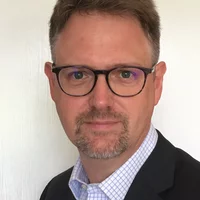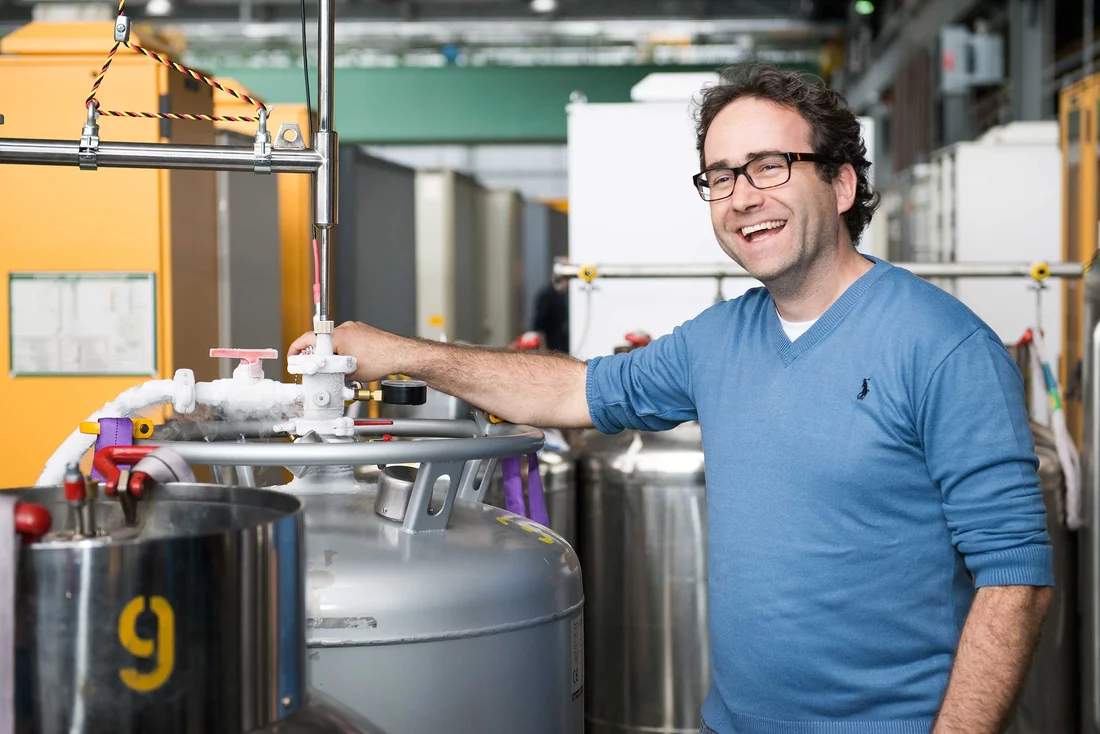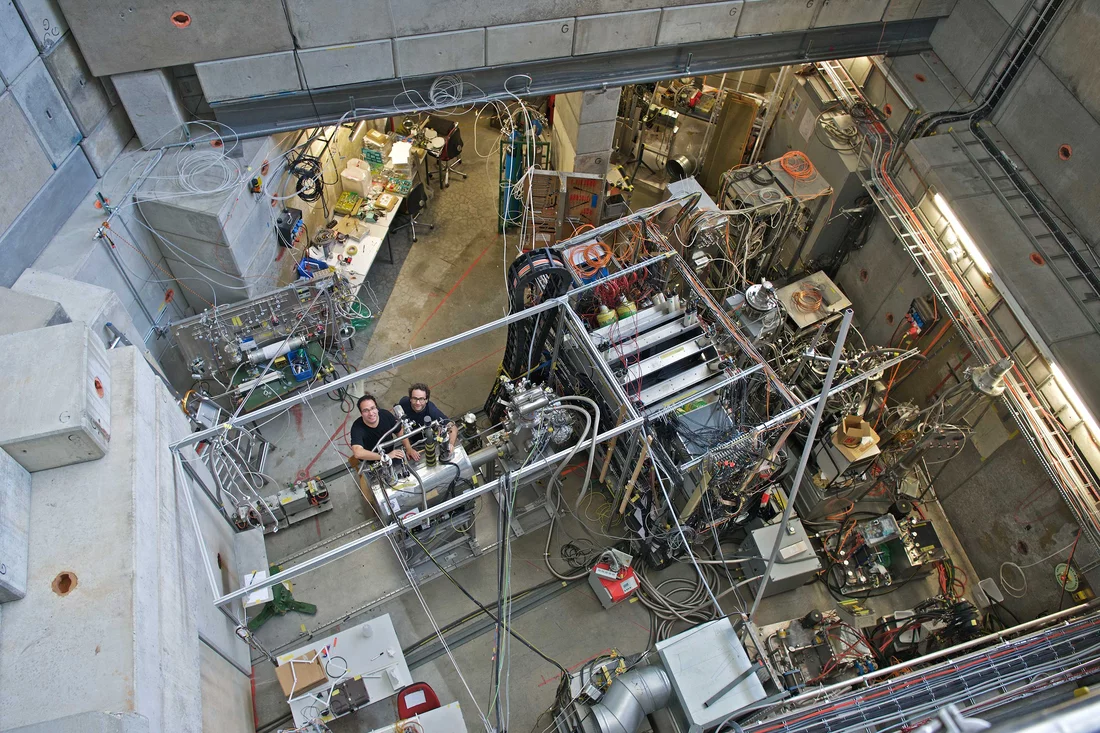For Aldo Antognini, physics and conviviality are in the blood
PSI researcher Aldo Antognini has received more than 2.2 million Swiss francs from the EU for his latest experiment. He wants to find out how magnetism is distributed in the proton. The particle physicist will be able to apply not only his scientific and technical talents, but his social flair as well.
On the night of 5th July, 2009, Aldo Antognini and his research colleague Randolf Pohl sat in a control container in the experiment hall at the PSI proton accelerator, facing monitor screens and a tangle of cables. They were exhausted from weeks of 24-hour shift operation in which, as part of a group of researchers, they were monitoring a trouble-prone super-laser they had built, which was supposed to help measure the radius of the proton. The 13-week long beamtime was running out in just a few days, and like the beamtimes in 2003 and 2007, it looked as if it would turn out to be a failure. The laser seemed to be aimed into nothing. It dawned on the researchers that the experiment was on the brink.
So at noon they decided to set the focus of the laser to a lower frequency than that corresponding to the expected size of the proton radius. Yet that too was fruitless. What if we assume a smaller radius?
, Aldo Antognini asked his colleague Pohl that night. The two decided to reset the laser on their own, a maneuver that would take several hours. Then the elusive resonance curve appeared on the monitor: The proton radius was significantly smaller than previously assumed. Instead of an aborted test they got a cover story in the renowned scientific journal Nature.
If the people don't fit together, the project is in jeopardy
Eight years later the 42-year-old Aldo Antognini, with brown curly hair and an open expression, takes a seat in the PSI canteen and plunks down a salad plate. Smiling, he describes, with his charming Italian accent, a strain that is hardly detectable. In a few days, his newest experiment will begin: the magnetic measurement of the proton. For the first five years, he was awarded a coveted European ERC Consolidator Grant worth more than 2.2 million Swiss francs. In addition, the Swiss National Science Foundation (SNSF) authorised a grant of 700,000 francs for this extensive project. The task would be more difficult than last time, Antognini says, the laser system even more complicated. Unlike in the last project, his own role this time will be less hands-on. As research leader, he will have to guide his team of two doctoral candidates and two postdocs, which he is currently assembling from dozens of applicants, with Skype calls all over the world. It has to be exactly the right people
, Antognini explains, because if they don't fit together, the project is in jeopardy
. He has already found one of them, Karsten Schuhmann. He is a very gifted laser physicist, essential for development of the innovative laser technologies needed for the project.
Here it is helpful that Aldo Antognini is not only technically but also socially gifted. As he runs through the PSI campus, a Hello
flies his way every few metres, which he acknowledges with a warm laugh. Aldo is not only a brilliant physicist, but also a person who is extremely competent socially
, says Randolf Pohl, who back then sat with him in the control container and today, as a professor at the University of Mainz, is also still doing research at PSI. Pohl recalls the spontaneous dinner, with risotto and dried cod, that Antognini hosted in his apartment in Würenlingen during shift work at the proton accelerator. Conviviality runs in his family. His parents run a grotto
restaurant in the Val Mesolcina, an Italian-speaking valley in the Swiss canton of Graubünden. As a child, little Aldo was already lending a hand with the kitchen work and service. In this way I learned to get along with all kinds of people
, he says.
Physicist and bookworm
Antognini's interests, too, extend beyond particle physics. Until shortly before he finished high school, this bookworm also considered studying philosophy. In the end he decided on physics and moved to Zurich to study at the ETH, yet his interest in intellectual pursuits never faded. Literary scholarship doesn't mean finding another dusty letter from Goethe in an attic
, says Antognini, alluding to an opinion many scientists hold. It shows us, for example, how Goethe's Faust speaks to us today.
But Antognini doesn't have much time for reading now that he is responsible for two additional experiments at PSI besides the existing project. For rest and relaxation, he sometimes heads back to his parents' lodge in the Alps and chops wood. Not often enough, unfortunately
, Antognini says with a shrug of the shoulders. Randolf Pohl even says, Aldo needs to slow down his pace. Otherwise he won't make it to retirement.
In late afternoon, Aldo Antognini walks through the proton accelerator's gigantic hall, resounding with the drone of the ventillation system, where he and his colleagues will carry out their magnetic measurement of the proton. Behind a steel door with a lock lies a tube-shaped room, in which glass cases hold the remains of the metre-long laser apparatus from the previous proton measurement. This is where, in the coming years, Antognini and his team will install their even more complicated new laser.
During the beamtimes, they will be here for weeks on end, drinking coffee from the vending machine and eating ready-made food, sleeping little, staring at the monitor screen and hoping that the numbers it displays fall into place along a resonance curve. But Aldo Antognini is grinning, full of anticipation. Beamtime is a beautiful time
, he says. Not only because it might produce scientific highlights, but also because it welds a team together. Such an experience is something I would wish on every researcher
, raves Antognini.
Text: Joel Bedetti
Background: ERC Consolidator Grant
The ERC Consolidator Grant of the European Research Council (ERC) provides funding to promising young scientists who are seven to twelve years past completion of their doctoral work. The goal is to support the researchers in consolidating the development of their research. Researchers can propose projects. These proposals are then evaluated on their scientific excellence. Successful projects are supported with up to two million euros over a five-year period. Aldo Antognini received the ERC Consolidator Grant for his projectHyperfine splittings in muonic atoms and laser technology (HyperMu).
Further information on the ERC Consolidator Grants: https://erc.europa.eu/funding/consolidator-grants


